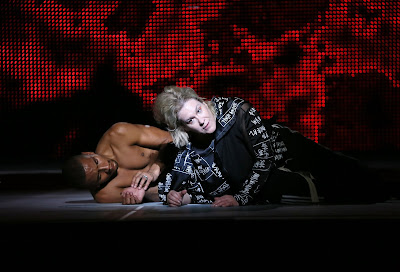 |
| Gluck: Orpheus and Eurydice - Sarah Tynan & dancer - English National Opera 2019 (Photo Donald Cooper) |
Reviewed by Robert Hugill on 1 October 2019 Star rating: (★★★★)
Cool modern style and emotional intensity in the first of ENO's Orpheus operas
 |
| Gluck: Orpheus and Eurydice - Alice Coote & dancer English National Opera 2019 (Photo Donald Cooper) |
Whilst Gluck's opera based on the Orpheus myth has become iconic and plays a large role in our narrative of the transformation of Baroque opera into Classical opera, Gluck himself clearly did not see the work as fixed and immutable. Premiered in Vienna in 1762, in three acts, in Italian with an alto castrato in the title role, Gluck then produced a slimmed down Italian version, in one act, for Parma in 1769 with the title role transposed up for a soprano castrato [recently performed by Classical Opera, see my review] Finally, in 1774, Gluck expanded the work for the Paris Opera with added ballet music (some taken from Gluck's 'reform' ballet, Don Juan), and the title role changed to an haut-contre, the French high tenor [staged at Covent Garden in 2015 with Juan Diego Florez, see my review].
 |
| Gluck: Orpheus and Eurydice - Sarah Tynan, Alice Coote - English National Opera 2019 (Photo Donald Cooper) |
McGregor and Clachan placed the action in a grey, neutral space with costumes for the living which had neutral, gender-unspecific aspects but which featured strong patterns (white on dark grey). As the action developed, movable screens at the back displayed a striking series of abstract, yet powerful video images, and the costumes for the inhabitants of the Underworld were vividly coloured, very abstract and rather distracting. The set took advantage of the size of the Coliseum stage, but the relatively openness at the rear and McGregor's fondness for having the singers up-stage amidst the action, meant that the sound of the voices was not always ideally projected. None of the theatres where the opera was performed during Gluck's lifetime was large, and in order to communicate the piece needs some help in a large space like the Coliseum, help that Clachan's set did not provide.
 |
| Gluck: Orpheus and Eurydice - English National Opera 2019 (Photo Donald Cooper) |
 |
| Gluck: Orpheus and Eurydice English National Opera 2019 (Photo Donald Cooper) |
Cutting quite an androgynous figure, Alice Coote made a strong, intense Orpheus, very much the concentrated, still centre of the production. She sang with a lovely rich, focussed tone and a great sense of line which created a very sculptural quality in the phrasing, which brought out the neo-classical element in the music. She had been announced as suffering a throat infection, this seemed to have little effect on her performance, thankfully.
Sarah Tynan was a cool, self possessed Eurydice. Vocally stylish with a hint of charm, her crucial scene with Coote's Orpheus in Act Four, touching though it was, did not quite tug the heart strings and move the work into a different emotional territory, as it should. at the end when Amor resurrected Eurydice, a dancer double appeared and for the finale Coote's Orpheus was paired with the dancer whilst Tynan's Eurydice paired with the striking, scantily clad dancer who had shadowed Coote's Orpheus during their trip to the Underworld.
Completing the trio of vocal artists was Soraya Mafi's pert, lively and charming Amor, overcoming a sequence of striking if distracting costumes.
With the chorus in the pit, an element of dramatic traction was unfortunately removed, though the unseen chorus sang stylishly and resolutely, in particular making fearsome furies in Act Two. Also in the pit, Harry Bicket drew strong and stylish playing from the orchestra. This was robust Gluck which respected the dramatic thrills but created a powerful neo-classical element too.
 |
| Gluck: Orpheus and Eurydice - English National Opera 2019 (Photo Donald Cooper) |
Elsewhere on this blog
- Yuval Sharon’s brand-new production of Die Zauberflöte at Staatsoper Berlin marks the first new production of this opera at this theatre in 25 years - (★★★★★) opera review
- Vicious scheming and visual splendour, but seduction too: Opera North's revival of Handel's Giulio Cesare (★★★★) - opera review
- A terrific company achievement: Martinu's The Greek Passion at Opera North (★★★★★) - opera review
- From folk-song and jazz to singing at Royal weddings: I meet members of The Queen's Six - interview
- With the harp at its centre the opening concert of the Hatfield House Chamber Music Festival was a rare treat (★★★★½) - concert review
- Anglo-Russian musical collaboration: the Britten-Shostakovich Festival Orchestra makes its London debut at the end of its inaugural tour of Russia and the UK - concert review
- Sheer delight: Iestyn Davies and James Hall in duets by Henry Purcell and John Blow (★★★★★) - CD review
- 25-year-old Puccini's original thoughts revealed in this recording of the first version of his first opera Le Willis - cd review
- From Latin-America with love: Gabriela Montero plays her own first piano concerto (★★★½) - CD review
- A mystical intensity: Mark Padmore and Kristian Bezuidenhout in Schubert's Die schöne Müllerin (★★★★½) - concert review
- The Roaring Whirl: for Sarah Rodgers returning to her cross-cultural musical narrative after 27 years brings mixed emotions - interview
- The other Fausts: a very different version of Gounod's classic opera is revealed by this important new recording from Palazzetto Bru Zane (★★★★★) - CD review
- Home











No comments:
Post a Comment